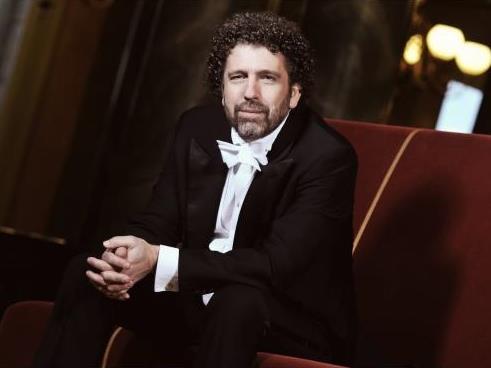Photo: Conductor Asher Fisch.
The seats on either side of the Hamer Hall stage, above the orchestra, are not always occupied but they were for last Saturday’s tribute to Tchaikovsky and Greig. For many, these seats are preferred, simply because they give a different view of the conductor and the instruments of the orchestra; The audience obviously anticipated that the visiting conductor, Asher Fisch, Principal conductor of the West Australian Symphony Orchestra, would inspire the MSO with as much exciting physicality as they have been accustomed to with Sir Andrew Davis at the helm, and indeed he did.
There would not have been anybody in that full house unfamiliar with the heart-wrenching theme of Romeo and Juliet. 500 years after the words were written by Shakespeare and 150 years after Tchaikovsky put the story to music, the effect it had was never anything less than first love.
After the first gentle drum rolls, the thundering clash of cymbals announced the family feud, leading the orchestra through a crescendo of French horns, flutes, violas and cor anglais to the entrance of the young lovers on a tidal wave of passion that sent chills up and down your spine. It was the heartfelt expression of one of the world’s most romantic composers whose own love life could never be acknowledged because of his homosexuality, unacceptable in those days. As Andrew Hall, second violinist with the MSO for 20 years, pointed out in the talk before the concert, this was the music of love ‘spoken from the heart to our hearts!’ But it was the skill of Asher Fisch that achieved the consummate blending of so many talented musicians, guiding them at a pace which matched your own heartbeat, never too fast, yet allowing the sweet notes from the harp, played by Yinuo Mu, to resonate more clearly than I have ever heard a harp played before. An exhilarating start to a marvelous concert.
Hall also gave a short background to the solo pianist, Benjamin Grosvenor, whose reputation, at age 23, has gone before him, and whom Hall felt was ‘the most extraordinary performer’ he had ever heard.
Like Tchaikovsky, Edvard Grieg was also a romantic and based the early part of his Piano Concerto in A minor on the folk music of his beloved Norway. The concerto is the only one Grieg wrote and it is considered one of the most popular in the world. Like so much memorable music, the major theme is based on five simple notes and the way this young pianist hit those notes gave immediate assurance that a treat was in store. So assured is Grosvenor that, much of the time, he was able to watch the conductor and orchestra while still producing the lightest touch, perfect timing and the ability to switch comfortably into the stronger, more demanding passages, crossing hands and expertly trilling from one end of the piano to the other. The result was complete synchronicity between piano and orchestra to the extent that, at the finish, even the musicians were applauding with their bows on their music stands as well as their hands.
I would have been content to waft away at this point but it was Tchaikovsky’s night and he wasn’t done with his rage against life’s disappointments which is really what his Fourth Symphony is all about. He made sure we knew that from the singularly dramatic opening to the rocky road that was to follow.
This Symphony is so detailed and complicated you really need to be a psychology major to appreciate the depth of sentiment this tortured man was trying to express. On the other hand, when you begin to dissect it, you find a human being under all the blustering and a man with a sense of fairness and fun. He demonstrated that sometimes you just have to make the best of your fate. No wonder Tchaikovsky’s music is still played with love around the world!
Rating: 5 stars out of 5.
Tchaikovsky and Grieg
Tchaikovsky Romeo and Juliet Fantasy Overture
Grieg’s Piano concerto in A minor
Tchaikovsky Symphony No. 4
Arts Centre Melbourne, Hamer Hall
Melbourne Symphony Orchestra
Conductor Asher Fisch
Solo pianist Benjamin Grosvenor
Saturday, November 14, 2015





